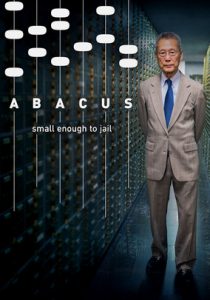Abacus: Small Enough to Jail-2017
Director Steve James
Scott’s Review #768
Reviewed June 6, 2018
Grade: B+
Abacus: Small Enough to Jail (2017) is a compelling documentary that received considerable attention after earning an Academy Award nomination.
The straightforward story never dulls or drags. It stays on point by telling a gripping courtroom-style legal thriller about a Chinese family’s struggle to keep their small banking business from criminal prosecution.
The documentary features the Sung family, led by patriarch Mr. Sung, who brought the family from China to start a banking business decades ago.
Since then, the family has set up roots in downtown New York City, launching a community-style bank to help people living and working in the Chinatown section.
The bank has become tremendously popular and culturally centered as a way to help struggling neighbors, and its business has thrived.
The Abacus Federal Savings Bank became the only one to face criminal charges following the mortgage crisis in 2009.
The documentary argues that this was because the larger banks were untouchable, and prosecutors desired to make an example of the banks because they were an easier target.
The documentary wisely presents both sides, featuring family interviews as well as the prosecutor’s arguments.
I found Abacus: Small Enough to Jail to move along quite smoothly and quickly. The documentary mainly focuses on the Sungs, who are all very driven people.
They reside in upscale Greenwich, Connecticut, and consist of a mother and father and three grown daughters in their twenties and thirties. The daughters are brilliant, and the entire family is intensely loyal to each other and their business despite scenes showing them bickering over trial strategies and takeout lunches.
The documentary mainly chronicles the prolonged five-year ordeal that the Sungs endured, involving a myriad of paperwork, trial dates, and other particulars. All the while, the family continues to uphold their business with gusto, but the trial takes quite a toll on the individuals, particularly the elderly patriarch.
It is tough to imagine anyone rooting for a bank, but that is the result.
Director Steve James is superb at portraying the Sung family sympathetically. There is never a doubt that he feels they have been victimized and sought after because they are a relatively easy target compared to the big boys of the banking world.
J.P. Morgan and Chase are deemed untouchable, which is a significant source of the problem and the film’s main objective to show.
Heartbreaking is a scene containing footage of at least a dozen or so Chinese bank employees being led to processing all chained together- chain gang style. This scene, shown relatively early in the documentary, cemented my support for the Sungs.
I asked myself, even if they were guilty, why the inhuman and racist treatment? When questioned about the poor treatment of the indicted, all the prosecution could muster was that it was “unfortunate,” hardly an apology.
The key element here and the main point of the story is that wrongdoing was committed, but the question asked is whether the Sungs knew about a few of their employees’ shenanigans, and I truly think not.
As the documentary explains, the jury had extreme difficulty reaching a concrete decision, which is why the trial dragged on and on. I asked myself, “If the large banks were bailed out with no prosecutions whatsoever, why should a mom-and-pop bank be targeted?”
Steve James creates an unexpectedly fast-paced piece. It is tough to do with dry financials, spreadsheets, and other banking-type particulars, but that is just what he does.
Objectively presenting the facts on both sides and offering many interviews and courtroom drawings, Abacus: Small Enough to Jail (2017) is a treat to view and captures a terrible time in United States history and how the undertones of racism still exist.
Oscar Nominations: Best Documentary-Feature
